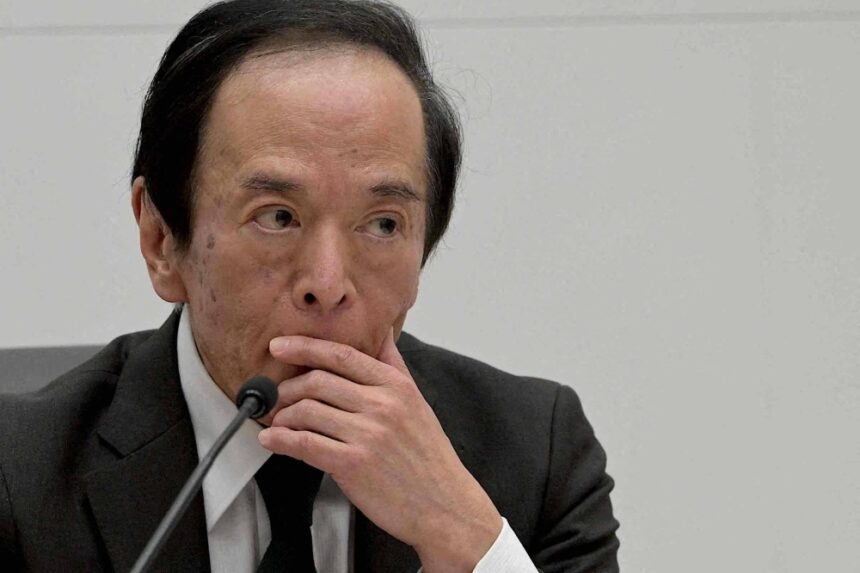Summary by Geopolist | Istanbul Center for Geopolitics:
The article delves into the economic turmoil Japan faces due to “Trumpflation,” a term referencing the inflationary pressures and global trade disruptions anticipated from the policies of Donald Trump’s second presidential term. The Bank of Japan (BOJ) is particularly vulnerable as it navigates an already fragile economy marked by slow growth, stagnant wages, and deep reliance on external markets, particularly China.
BOJ Governor Kazuo Ueda is taking proactive steps to mitigate the economic repercussions anticipated from Trump’s possible policies, such as heightened tariffs, trade conflicts, and more stringent immigration regulations. These policies pose a risk to Japan’s trade flows and economic stability, particularly if Japan is subjected to new tariffs, similar to the situation during Trump’s previous presidency.
Compounding the challenge is Japan’s distinctive role in the global economy. The dependence on exports, especially to China—its primary trading partner—means that any global trade tensions or attempts at economic decoupling could have a substantial negative impact on Japanese industries. At the same time, Japan’s persistent issues with deflation and stagnant wages hinder its capacity to withstand external shocks.
The article outlines that Trumpflation not only creates uncertainty for the global economy but places additional pressure on the BOJ to maintain its ultra-loose monetary policy. However, this policy has its limitations, as it further widens wealth inequality and strains the financial sector. Governor Ueda faces the delicate task of balancing the need to stimulate growth while preparing for external shocks from Trump’s policies and volatile global markets.
Read the full article below.
‘Trumpflation’ already wreaking havoc on Bank of Japan
The Bank of Japan is having a very public run-in with the Donald Trump 2.0 White House before it’s even arrived.
The second Trump presidency is still four weeks away, but Tokyo is already battening down the hatches. Nowhere more than at BOJ headquarters in Tokyo, where Governor Kazuo Ueda is leading Asia’s second-biggest economy toward the complete unknown.
Surely, Japanese Prime Minister Shigeru Ishiba would dispute this characterization. But with approval ratings in the 20s and his ruling Liberal Democratic Party barely hanging on to power, Ueda is firmly in the driver’s seat.
The problem is not knowing which Trump might arrive in the White House on January 20. Door No. 1 is transactional Trump, ready to negotiate a “grand bargain” trade deal with China and possibly others. Door No. 2: a “Tariff Man” era that launches trade wars the likes of which the globe has never seen before.
This uncertainty explains why Ueda’s policy board left rates unchanged last week. And why a January rate hike is probably off the table, too. “Uncertainty surrounding Japan’s economy and prices remains high,” the BOJ said in a statement last week.
Domestic challenges are bad enough. As Japanese growth underwhelms, Team Ishiba is scrambling to roll out new fiscal stimulus to boost domestic demand. Not exactly a great environment for the BOJ to hike rates.
China’s economic slowdown is its own quandary. The deflation that Asia’s biggest economy is exporting scares Tokyo to the core. For generations, Japan was accused of generating more headwinds than growth. Now it’s China, by far Japan’s top export market.
Yet it’s the combination of Trump’s threatened trade war and domestic plans to deport millions of illegal migrant workers that worries Asia. The high odds this will produce what market watchers have coined “Trumpflation” has Ueda’s BOJ in a whirl.
That goes too for policymakers from Bank of Korea Governor Rhee Chang-yong to European Central Bank Governor Christine Lagarde.
“In Japan, industrial production likely fell 3% in November from October,” says Stefan Angrick, an economist at Moody’s Analytics. “Industry forecasts for November have looked poor, with firms pointing to falling output across machinery, cars and electronics.”
The bigger problem is wages. Optimism over last year’s Spring wage negotiations has long since faded. The biggest gains for union workers in 33 years didn’t kick off the virtuous cycle of fattened paychecks and increased consumption many had hoped for. As 2024 ends, inflation-adjusted pay is flat.
Dueling concerns about China’s slowdown and Trump’s barrage of tariffs could dissuade Japanese CEOs from boosting pay in the year ahead. This risk is complicating the BOJ timeline for rate hikes.
Earlier, economists thought a December rate hike was a done deal. Then, a parade of BOJ officials stepped to the microphone to signal no tightening would be forthcoming. Though “Trump trade” risks weren’t highlighted specifically, they were written between the lines in bold font.
The 60% import taxes Trump has threatened for Chinese goods would put Japan at the center of the collateral damage zone. Any significant growth downshift in Japan’s biggest customer could devastate its 2025.
Japan Inc worries, too, that Trump might train his tariffs its way. Trump has refused Ishiba’s reported numerous requests for a pre-inauguration meeting. This has Japan worried Trump doesn’t see Ishiba as a vital partner in the same way he did 2012-2020 Prime Minister Shinzo Abe.
And that the 100% tariffs Trump plans for Mexico-made autos might be aimed next at Toyota, Honda and Nissan. That might complicate efforts by the latter two companies to merge forces to increase global market share.
For Ueda’s BOJ, regret must be the feeling of the moment. In the 15 months after taking the helm in April 2023, Ueda dragged his feet on boosting rates to 0.25%, where it remains currently. That’s despite stable growth and global markets being primed for higher Japanese rates.
Having squandered that window of opportunity, Ueda now finds himself on the defensive. With Ishiba’s party on the run, political pressure against rate hikes is surely mounting. It hardly helps that the LDP is now relying on the support of opposition parties to retain power.
On the other side, there’s a real risk of “Trumpflation” that reverberates back Japan’s way. The risk has been highlighted by economists including Nobel laureate Paul Krugman as Trump rolls out policies that seem sure to heat up global pricing pressures.
Trump’s tariffs “would result in a notable increase for consumer prices in the US. Using our rule of thumb that every 1 [percentage point] increase in the effective tariff rate would raise core PCE prices by 0.1%, we estimate that the proposed tariff increases would boost core PCE prices by 0.9% if implemented,” Krugman wrote.
Or more, if Trump makes good on rounding up millions of undocumented workers, making tight US labor markets even tighter.
Richard Katz, author of “The Contest for Japan’s Economic Future”, says that domestic price trends “along with Trumpflation and a weaker yen, are making the BOJ far less confident in its baseline. So … the BOJ is waiting until more evidence comes in.”
Ueda’s policy board “faces a dilemma,” Katz says. “Normally, expectations of higher inflation in Japan would cause the BOJ to raise interest rates. That would not only narrow the rate gap — and thus counter the downward pressure on the yen — it would also fight the expected inflation.”
On the other hand, Katz adds, “the weaker yen and other factors have been reducing real wages and, thus, consumer spending for most of the past five years. That weakens economic growth and the BOJ needs to keep rates low to keep the economy afloat.”
To make matters worse, Katz notes, it’s uncertain how much and when Trump will implement the policies he campaigned and won on.
On the domestic Japan front, it’s an open question whether the gains in nominal wage hikes that employers granted this year will be repeated next year. It’s also unclear if nominal hikes will lead to real wage gains because the severity of imported inflation remains unclear.
All this is putting downward pressure on the yen. Last week, Finance Minister Katsunobu Kato said he was “deeply” concerned about the yen’s recent plunge.
“The BOJ’s entire inflation strategy depends on keeping nominal wage hikes at 3% per year, with the hope that this will lead to hikes in real wages,” Katz says. “It will take several months to see the wage picture for fiscal 2025. So, at least for this month, the BOJ is adopting a wait-and-see attitude.”
Daisuke Karakama, chief market economist at Mizuho Bank, says “I’m not sure if yen weakness can be contained until March.” He adds that there’s “no guarantee” the yen won’t break through 160 to the dollar by January.
Nor is there any guarantee which Trump Japan might encounter come January. And the degree of the “Trumpflation” that might follow.
By: William Pesek
Source: Asia Times







